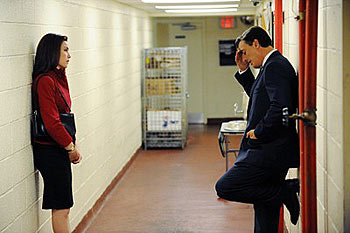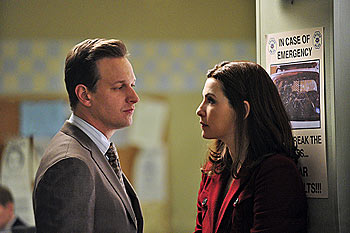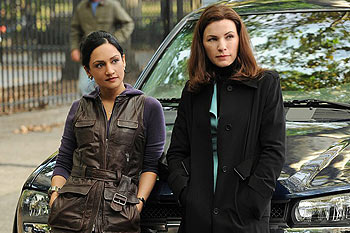The Big, Bad World Of The Good Wife
Published on January 30th, 2011 in: All You Need Is Now, Current Faves, Feminism, Issues, TV |
Alicia and Peter Florrick
At first, preview spots for CBS’s The Good Wife looked less than promising: another press conference, about another cuckolded wife of a politician. Even the casting of dashing Chris Noth and long-absent-from-TV Juliana Marguiles didn’t appeal to me.
Then there was the name of the show itself: The Good Wife. It just seemed . . . stuffy.
I started catching bits and pieces of the show by accident. Despite my misgivings, it was actually intriguing, on par with the best episodes of Law & Order (Rest In Peace). Then one night I was flipping channels and there was Alan Cumming as conniving political campaign manager Eli Gold, bitching out and out-bitching some snarky-looking teenage girl. Suddenly, I was hooked.
As you may already know, the premise of the show is fairly simple: cuckolded wife (Juliana Margulies as Alicia Florrick) of possibly-crooked State’s Attorney (Chris Noth as Peter Florrick) has to go back to work in a law firm after having been a stay-at-home mom for over a decade. Again, it doesn’t sound that thrilling, but somehow it is.
What makes The Good Wife work is that Marguiles’ character truly is a good wife. Alicia gave up her own career to support Peter’s and he’s repaid her in very unkind ways. You sympathize with her situation. Early episodes focused on how intimidated and out of the loop Alicia feels when returning to the workforce: missed meetings, constant annoying cell phone calls from her teenage kids, an overbearing mother-in-law, an intimidating female boss . . . then there’s the issue of catching your co-workers listening to your husband’s sex tapes on the Internet, after you’ve just visited him in jail.
About ten episodes into the first season, The Good Wife really hit its stride, creating and developing a persistent aura of unease. There’s a constant lurking danger that more unpleasantness will soon be revealed on the show: What new aspects of Peter’s scandal will come to light? How many more unsavory characters and situations will present themselves, and can Alicia deal with them? Who can she trust, if anyone?
Fellow attorey Cary Agos (Matt Czuchry) is perhaps the epitome of this unease. He seems okay at first, if a little ass-kissy, then develops into a downright sleazemeister. And yet, he has strong flashes of integrity that constantly confound us. We are never sure if his sneaky antics are the result of misinformation about Alicia’s rapid rise to prominence at the firm or just a cold, black heart.

Will Gardner and Alicia Florrick
Adding to the stress of everything else, former classmate and friend Will Gardner (played by Josh Charles) is the one who hired Alicia for the position and naturally, there is some romantic tension between them. It’s just enough to add to the litany of uncomfortable and confusing predicaments Alicia finds herself in, but not so much that the entire show becomes another entry into the played-out “Will they or won’t they?” genre of TV dramas.
Partner Diane Lockhart (played by the excellent Christine Baranski) is probably the most difficult character to warm up to; despite her admirable success and political convictions, she’s a ball-buster. Yet when she embarks on an ill-advised romance with a right wing ballistics expert it shows her depth; when a political idol is accused of rape, those convictions are challenged and we see her humanity.
Tough, resourceful in-house investigator Kalinda Sharma (played by Archie Panjabi) is perhaps my favorite character (and Panjabi’s 2010 Emmy win was well-deserved). There are even more layers of mystery to Kalinda: her past, her methods of finding information, her sexuality . . . even her allegiances and alliances are never fully explained or understood.
Chris Noth portrays Peter Florrick with the swagger of a politician but with enough genuine charm that we can understand why Alicia didn’t divorce him outright. There’s an enticing dynamic at play: we see Alicia falling out of love with Peter and focusing on her own needs as we see Peter falling in love with Alicia for that very focus.
The Florrick kids aren’t just wallpaper to fill out the family values quotient, either. Zach (Graham Phillips) and Grace (Makenzie Vega) seem like good teenagers, which helps us care about them more. While the affect of the scandal and Alicia’s job on them is not pushed to the sidelines, The Good Wife isn’t a shallow teen drama.
Finally there’s Eli Gold (Alan Cumming), Peter’s foulmouthed, obnoxious (and hilarious) campaign manager who must be seen in action to be fully appreciated, particularly when he’s pitted against Peter’s nosy, old-fashioned mother Jackie.

Kalinda Sharma and Alicia
Despite the intrigue between the characters, there are ongoing court cases that, more often than not, hold our rapt attention and sometimes relate directly to the characters’ personal drama. The Good Wife deftly weaves in topical issues without looking like they’re gunning for ratings or “ripped from the headlines” sensationalism: Muslim extremists, wiretaps, Big Pharma, political pundits, insurance companies, the US military, and death row inmates are all handled with dramatic, authentic skill. The omnipresence of technology plays a huge role in the show as Photoshop, iPods, Twitter, Facebook, viral videos, emails, texts, and cell phone messages all figure heavily into the various plotlines.
At the center of this maelstrom remains the good wife herself, Alicia. Although we feel for her situation, she radiates the strength and integrity that ground the show, transforming it into something deeper than the kinds of trashy scandals TMZ covers. In this way, The Good Wife is also about what it means to be famous. Is the modern definition of fame just infamy and celebrity-obsessed culture? Everyone wants a piece of Alicia’s fame, even though she seems to want nothing to do with it. Or does she?
At first, Alicia just wants everything to go back to normal, although as she tells Peter, she knows it never will. Later, when Peter is released from jail and decides to run for State’s Attorney, Alicia insists that she still wants to work. She even decides to capitalize on her politically scandalous past to keep her job and to win cases. Has being torn apart by her kids, career, husband, and a potential love interest changed the core of Alicia Florrick? Have the moral sacrifices she’s made to be a good lawyer made her less of a good wife?
Season Two is only halfway through and I will definitely stay tuned to see how these compelling questions will be answered.
Time limit is exhausted. Please reload the CAPTCHA.